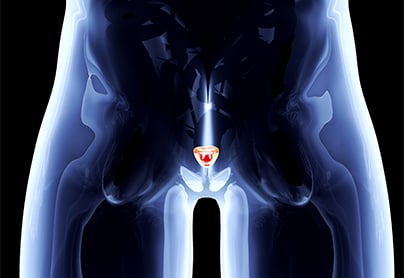Recipes
Prostate cancer is a malignant cell growth in the prostate gland. Prostate cancer typically is a slow-growing cancer, but less commonly it may spread to other parts of the body.

Prostate cancer is the second leading cause of cancer death in the United States, and it is estimated that 1 in 6 (16.2%) will be diagnosed with the disease and approximately 1 in 33 (3%) will die of it.1Prostate cancer mainly affects older men, and because most prostate cancers grow slowly, most men with prostate cancer end up dying of something else. A small percentage of prostate cancers are fast-growing, however, so ignoring the risks is not the right approach. Symptoms of prostate cancer may mimic an enlarged prostate and may also include the following signs or symptoms:
It is thought that prostate cancer risk may start very early in life such as from toxic exposures and/or dietary factors. Trends from population studies have shown associations that suggest various lifestyle factors may influence risk of prostate cancer including:
Eating too many animal products raise IGF-1 and cadmium levels in our bodies as well as can affect other factors such as excess hormones, all of which have been associated with cancers, specifically prostate cancer. Foods high in lycopene (and other carotenoids), plant sterols, selenium, and other nutrients (such as in tomatoes, seeds, other vegetables, etc.) lower risk. A Nutritarian lifestyle takes advantage of these and many other cancer protective nutrients, while minimizing foods that raise risk.
Read more: Do you have a supplement formulated to enhance protection against cancer?
Increased physical activity in general is associated with lower prostate cancer risk, however, it appears not protective enough alone, without implementing dietary prevention strategies.
Position Paper: IGF-1, Dietary Protein and Cancer
Sign up for the online Combat Autoimmune Disease and Cancer Masterclass
ONLINE: All members of DrFuhrman.com can search the Ask the Doctor archives for discussions on this topic. Platinum and Diamond members can connect with Dr. Fuhrman by posting questions in the forum. Not a member? Join now.
IN PERSON: Book a stay at Dr. Fuhrman’s Eat to Live Retreat in Southern California. With options ranging from one, two and three months (and sometimes longer) you will be under Dr. Fuhrman’s direct medical supervision as you hit the “reset” button on your health. For more information: (949) 432-6295 or info@ETLRetreat.com.
EVENTS: Join Dr. Fuhrman for an online boot camp, detox or other event. During these immersive online events, you’ll attend zoom lectures, follow a special meal plan, and have access to a special, live Q&A session with Dr. Fuhrman. Learn more about events.
The following are sample questions from the Ask the Doctor Community Platinum and higher members can post their health questions directly to Dr. Fuhrman. (All members can browse questions and answers.)
Do you have a supplement formulated to specifically to enhance protection against cancer?
Dietary supplements by definition do not treat, prevent, or cure a disease and cannot claim to on labels or in advertising. However, plant extracts are continually being studied for their potential to maintain health and affect the disease process. Clinical trials are being conducted, aiming to figure out whether certain plant extracts could affect cancer-related biomarkers, act as beneficial adjunct treatments to be used with chemotherapy, or help to prevent progression of an early stage cancer or pre-cancerous condition. Read more
Recently, after taking a routine blood test, my doctor informed me that my PSA was 13.4. Does this high PSA mean that I have prostate cancer? If so, does PSA determine what stage I am at? I went to see the urologist who informed me that I should do a biopsy and ultrasound. What would you advise as my next course of action?
On a global scale, testing and treating men with a PSA level like yours has not been shown to extend lifespan. There is no convincing evidence in the scientific literature that evaluating and treating prostate cancer is extending the healthy life expectancy of men. In other words, all the tests and treatments may be a big money-generating medical industry, but they do not prolong lifespan in men.
On an individual level, if I were you, I would follow a Nutritarian diet strictly (with a glass of green juice once a day) and follow up my PSA levels in 6 months to see how low I can get it to go. If it improves and does not keep rising, I would continue to only treat it nutritionally. The standard of care, however, is to get tested and treated if cancer is found, but I am less concerned with whether the biopsy shows prostate cancer or not, as I have even seen those reverse (as has Dr. Ornish). So, you have all the options, but it is still your decision. The option I am recommending here is often called "watchful waiting" by physicians.